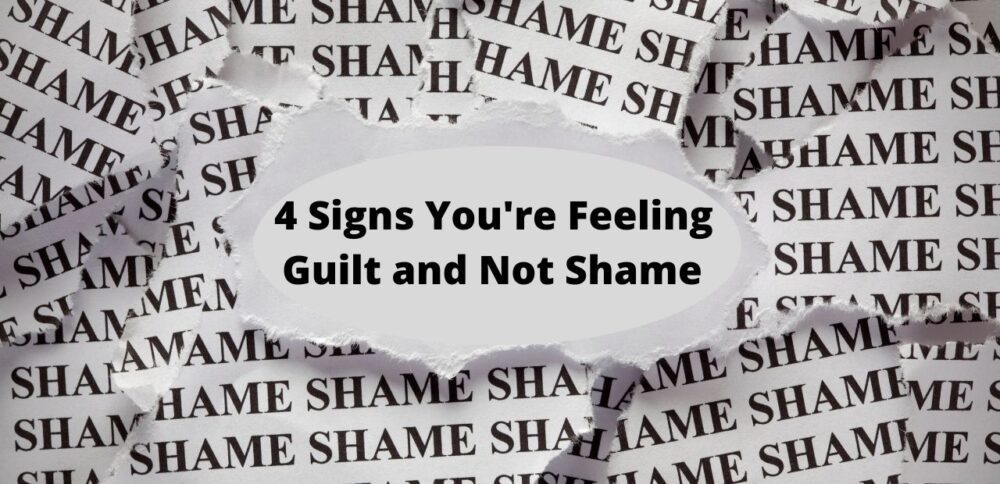This article was developed via a partnership with BetterHelp.
Guilt and shame are emotions that are often used interchangeably in conversation, even though they are two separate emotions. If you do not understand the difference between guilt and shame, you may be wondering how to tell which one you are feeling and what it means for you.
Here are the top four signs you’re feeling guilt and not shame.
You Did Something Wrong or Think You Did
If you are feeling guilty, it is usually because you did something wrong or believe you did something wrong. Guilt can be caused by something as “small” as forgetting to say “Happy Birthday” to your friend on her birthday.
It can also be as big as feeling guilty for lying to someone you love or cheating on them. Guilt is an emotion that teaches us when we’ve done something wrong and when it’s time to make amends. If you feel that you’ve done something wrong, you’re most likely feeling guilty.
However, if you feel that you yourself are wrong as a person, it’s most likely shame.
You Don’t Feel Bad About Yourself
Shame makes us feel bad about ourselves, which in turn makes us believe we are flawed and unworthy of love or affection. Shame is common in situations where you may have experienced trauma or been told you are bad for something you’ve done. It is also common in those with anxiety conditions. Guilt can trigger shame, which is why you may feel both at the same time.
Even though guilt can cause some low self-esteem issues, it is not based on the self or the belief in your level of goodness. Guilt is simply an emotion that shows us we have done something against our moral code or that has hurt someone else. It can even be an emotion we feel when we hurt ourselves or do something we’re not proud of.
You Feel the Urge to Make Amends
Since guilt is highly related to feeling that you’ve done something wrong or gone against your moral code, it can cause you to feel an urge to make amends or grow as a person. Guilt often allows us to make necessary changes in our lives.
With shame, there may not be any urge to make amends because you may not have done anything wrong, or you’re too focused on your low self-esteem to think about how your actions affected those involved.
You Are Motivated By Your Guilt
Guilt motivates some people to do better. It allows you to see where you went wrong, why it happened and allows you to feel calm and level-headed enough to change the behavior.
Shame does not motivate you. It makes you feel like a bad person, and you will therefore feel that you are not good enough to make changes or try to do better. Shame is very sticky and stagnant energy, whereas guilt allows you to make movements and see yourself as a human who is trying their best.
If you find yourself feeling shame instead of guilt when you’ve done something wrong, you may want to see a therapist to talk about the reasoning behind it, as shame often comes from a history of trauma and disordered relationships.
What Is Shame?
Shame is an emotion, like guilt, that is felt when we do something wrong or when someone else tells us we did something wrong. However, it isn’t always accurate. It also isn’t always very productive.
Shame can make you feel like:
- You are bad
- You are unlovable
- You are horrible
- You don’t deserve redemption
- You will never be better
- You will never feel better
- People will always hurt you
It can also make you feel like there’s no use in trying to understand whether you did something wrong if you’re already “bad.” If you feel shame because someone else is telling you that you’re “wrong” or “bad,” you may need professional help or the opinions of someone you trust to figure out if they are right that you did something wrong.
Even if you did do something wrong, there is no situation in which you are inherently “bad” or “evil,” and it does not help to tell yourself that or allow other people in your life to try to tell you that you are too.
Conclusion
Now that you’ve learned a little bit more about shame and guilt, you will be able to identify which emotion you’re feeling when it comes up. Shame tends to sit in the belly and is a heavier feeling. Guilt feels like a lighter version of shame, which may eventually feel motivating and positive instead of negative.
If you’re struggling with understanding these concepts, you may want to speak to a professional or review some expert advice on BetterHelp. They can help you further understand what guilt is and how to learn from it.

